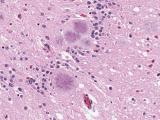Jun 28, 2004 (CIDRAP News) The US Department of Agriculture reported an "inconclusive," or preliminary positive, test result in its screening program for bovine spongiform encephalopathy (BSE) Jun 25 and is awaiting confirmatory test results.
The inconclusive result was the first since the USDA expanded its BSE testing program Jun 1 in an effort to test more than 200,000 cattle over the next 12 to 18 months. In announcing the finding, Dr. John Clifford, deputy administrator of the Animal and Plant Health Inspection Service (APHIS), said confirmatory tests would be completed in 4 to 7 days.
"The inconclusive result does not mean we have found another case of BSE in this country," Clifford stated. "Inconclusive results are a normal component of most screening tests, which are designed to be extremely sensitive so they will detect any sample that could possibly be positive" (italics in original).
Because the confirmatory tests could be negative, Clifford did not report the age, breed, or sex of the animal involved, the laboratory that did the screening test, or where the animal came from. He said the animal did not enter the human food supply or animal feed.
Tissue samples from the animal were sent to the National Veterinary Services Laboratory in Ames, Iowa, for the confirmatory testing, Clifford said.
Clifford said the USDA "remains confident in the safety of the US beef supply." The ban on putting "specified risk materials"tissues most likely to carry the BSE agent in an infected animalinto the food supply would protect the public if any more BSE cases were found in the United States, he said.
He added that some inconclusive results are expected in screening test programs, since screening tests "are designed to cast a very wide net."
The USDA had tested 5,668 cattle for BSE from Jun 1 through 21, according to APHIS figures. The agency says it has 99% confidence of detecting BSE at a level of one case in 10 million cattle if it tests 268,000 cattle during the expanded screening program.
See also:
Jun 25 USDA statement
http://www.usda.gov/Newsroom/0263.04.html
















